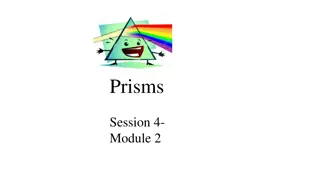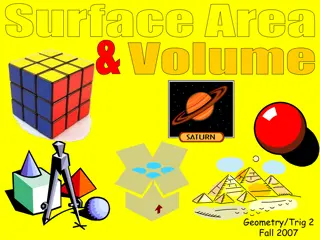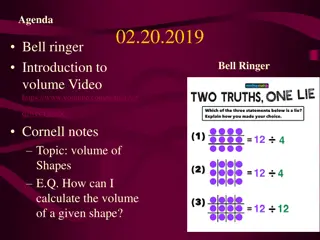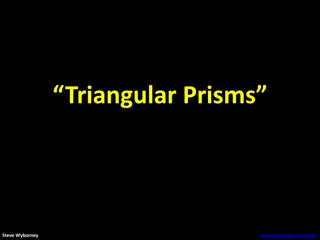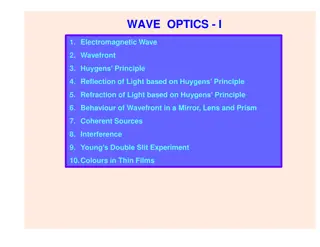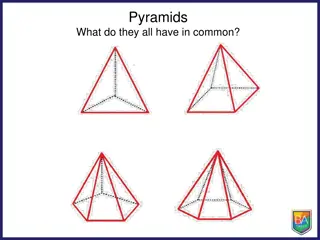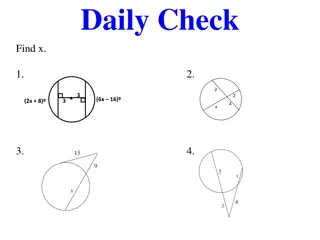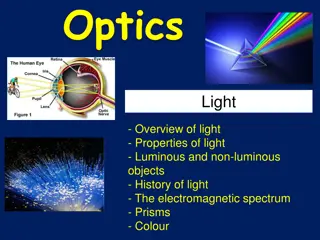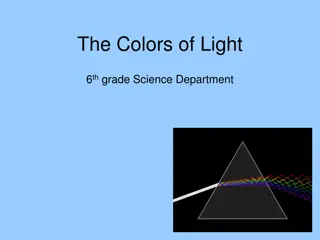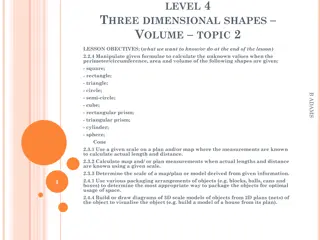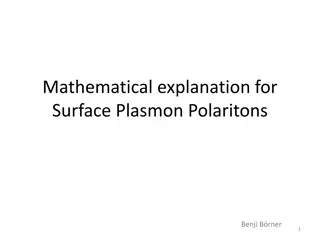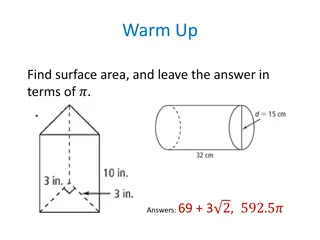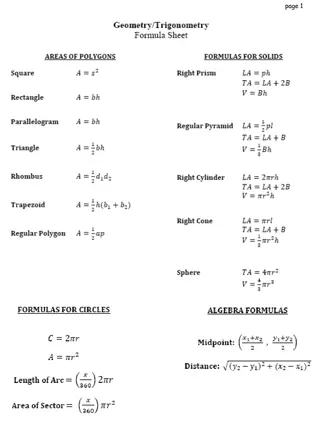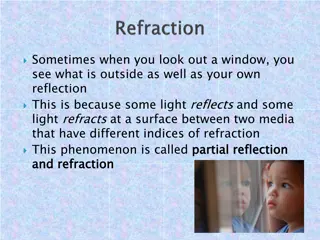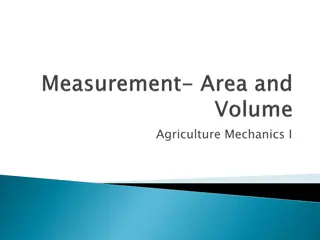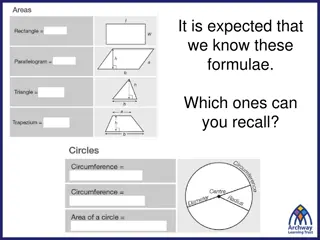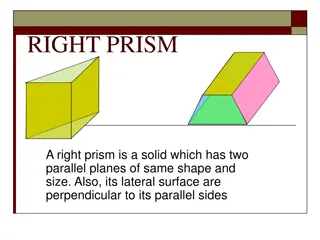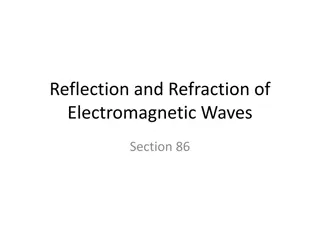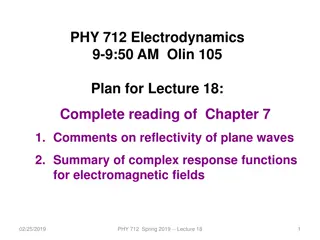Prism Terminology and Light Deviation
Prisms are optical devices that deviate light without changing its vergence. This module explores the various terminology associated with prisms, including Apex, Base, Refracting Angle, and Angle of Deviation. The passage of light through a prism follows Snell's Law, where the ray is deviated toward
5 views • 42 slides
Fresnel Prisms: Advantages, Disadvantages, and Applications
Fresnel prisms, a type of prism where the angle of refraction only depends on the surface angle and material's refractive index, offer advantages such as thinness, lightweight, and flexibility but have disadvantages like cosmetic differences and reduced visual performance. They find applications in
13 views • 24 slides
Diffraction of Light: Types and Distinctions
The propagation of light according to the wave theory involves diffraction, where light waves exhibit bending around obstacles, causing a decrease in intensity. There are two main types of diffraction - Fresnel's and Fraunhofer's, each characterized by different conditions and behaviors. The distinc
1 views • 7 slides
Surface Area and Volume in Geometry
Gain insights into calculating surface area and volume of geometric shapes, specifically focusing on rectangular prisms. Learn how to find surface area and lateral area using formulas, and explore examples illustrating these calculations step by step with images.
2 views • 57 slides
Measurement: Calculating Perimeter, Area, and Volume
Dive into the world of measurement with a focus on calculating perimeter, area, and volume for shapes like rectangles, triangles, circles, and prisms. Learn key formulas and methods to determine these crucial metrics through practical examples and step-by-step calculations.
1 views • 34 slides
Physics Clicker Questions Compilation
A collection of physics clicker questions covering various topics such as ball motion in circular tracks, light refraction through prisms, phases of the Moon, velocity graphs, integration methods, and work minimization strategies. Each question is presented with accompanying images and scenarios for
1 views • 17 slides
Introduction to Volume Calculation for 3D Shapes
Understand the concept of volume for 3D shapes through examples like cylinders, prisms, and pyramids. Learn how to calculate volume, the importance of units cubed, and identifying different 3D figures based on their characteristics.
1 views • 25 slides
Fun Math Activity: Guess How Many Triangular Prisms!
Enjoy a fun math activity where you have to guess the number of triangular prisms in a glass based on clues provided. Follow the clues, make estimations, and narrow down your possibilities to arrive at the answer. Challenge your estimation skills and see if you can come up with the correct number of
0 views • 6 slides
Surface Area in Mathematics
Delve into the concept of surface area as an essential mathematical topic, understanding its significance in everyday life and its application in various 3D shapes. Learn how to calculate surface area for different space figures like prisms and pyramids through step-by-step methods. Engage with esse
7 views • 21 slides
Introduction to Spectroscopic Instrumentation and Monochromators
Today's lecture covers spectroscopic instrumentation with a focus on monochromators. It delves into the components and performance measures of spectrometers, including wavelength discrimination filters, light detectors, and energy dispersive detectors. The dispersion of light through prisms and grat
0 views • 17 slides
Wave Optics Principles
Explore electromagnetic waves, wavefronts, Huygens' principle, reflection, and refraction of light based on these principles. Learn about the behavior of wavefronts in mirrors, lenses, and prisms, as well as coherent sources, interference, and the Young's double-slit experiment. Dive into the world
2 views • 34 slides
Pyramids and Prisms in Geometry
Explore the common characteristics of pyramids and prisms, learn about their definitions, faces, edges, and vertices, and understand Euler's formula for polyhedra. Discover the properties of different pyramids and prisms and predict results based on various base shapes. Verify Euler's formula for pr
1 views • 14 slides
Proper Care and Maintenance of Optical Equipment to Prevent Infections
Regular examination and proper cleaning of tonometer prisms are essential to reduce the risk of transmitting infections during eye examinations. Disinfection and sterilization processes are crucial in maintaining optical equipment hygiene. Different disinfectants and physical methods can be used to
0 views • 24 slides
Optical Frequency Interferometer Bench Analysis
Detailed examination of the optical setup for an Optical Frequency Interferometer (OFI) system, including the input/output configurations with various optical components such as prisms, crystals, and wave plates. The analysis focuses on the path and behavior of beams within the system, considering r
1 views • 14 slides
Advanced Microscopy Techniques in EUV Lithography: SHARP Overview
SHARP utilizes Fresnel zone plate lenses to achieve diffraction-limited quality in EUV lithography, offering a range of NA values and image magnifications. The system allows emulation of mask-side imaging conditions with hundreds of lenses available. Coherence control and engineering are provided th
2 views • 18 slides
Volume Formulas for Geometric Shapes
Exploring the concepts of volume calculation for various geometric shapes like cylinders, prisms, cones, and pyramids. Learn about the formulas, properties, and relationships between different parts of these shapes. Visual aids and step-by-step explanations provided for better understanding.
1 views • 28 slides
Geometric Solids Volume Formulas Explained
Understanding the volume of geometric solids is crucial for various practical applications. Learn about different shapes like rectangular prisms, cylinders, cones, and spheres, along with their respective volume formulas. Dive into the concepts of diameter, radius, and height to master calculations
1 views • 13 slides
Light: Properties, Sources, and Effects
Explore the fascinating world of light, from its origins in the sun through processes like nuclear fusion, to its incredible speed and unique properties. Learn about luminous and non-luminous objects, the electromagnetic spectrum, prisms, and the colors of light. Delve into the history of light and
0 views • 36 slides
The Colors of Light in Science
Dive into the world of light and color with insights on prisms, white light, primary colors, and the electromagnetic spectrum. Understand how wavelengths determine the color of objects and learn about reflection and absorption of visible light.
0 views • 9 slides
Mastering Volume and Scale Calculations for Three-Dimensional Shapes
Dive into advanced 3D shapes volume calculations and scale manipulations to solve for unknown values using various formulas. Explore packaging arrangements, surface area calculations, and map scale conversions for real-world applications. Practice working with complex shapes like cones, spheres, and
0 views • 8 slides
Mathematical Insights into Surface Plasmon Polaritons
This mathematical explanation delves into the intricacies of surface plasmon polaritons, covering Maxwell's equations, wavenumbers, bulk and surface plasmon-polariton formulations, medium considerations, excitation conditions, losses, and matching examples with air, gold, and sapphire prisms. Detail
0 views • 13 slides
Scandinavian Cultural Prisms and Values in Society
Explore the unique cultural prisms and values in Scandinavian society, including perspectives on equal opportunity, preservation of culture, lifestyle pragmatism, and more. Delve into the rich heritage of the region, from egalitarian values to social systems that prioritize quality of life over quan
0 views • 32 slides
Geometry Concepts for Surface Area Calculations
Explore various geometric shapes such as pyramids and cones to calculate surface area. Learn the differences between prisms and pyramids, understand the importance of altitude and slant height in pyramids, and differentiate between lateral and surface areas. Practice finding lateral and surface area
0 views • 16 slides
Geometry: Lateral Area, Total Area, and Volume of Right Prisms
This educational content covers the concepts of lateral area, total area, and volume calculation for right prisms, specifically focusing on rectangular, triangular, trapezoidal, and hexagonal right prisms. It includes detailed explanations, formulas, and examples to help you grasp these geometric pr
1 views • 22 slides
Studio Lights and Audio Systems for Effective Productions
Explore the various types of studio lights such as quartz or tungsten-halogen lights, Fresnel spotlight, flood lights, base lights, and eye light. Learn about the functionality, purpose, and setup of studio lights for creating optimal lighting effects. Additionally, delve into the audio system compo
0 views • 21 slides
Reflection and Refraction Phenomena in Optics
Reflection and refraction are fundamental phenomena in optics, occurring when light encounters surfaces with different indices of refraction. This results in partial reflection and refraction, with the amount of each depending on the angle of incidence. Beyond a critical angle, total internal reflec
1 views • 12 slides
Areas and Volumes of Similar Solids: Identifying Similar Shapes
the concept of similar solids through rectangular prisms and square prisms. Learn how to determine if two figures are similar and calculate the scale factor between them. Understand the relationship between corresponding areas and volumes of similar shapes. Practice finding the scale factor between
0 views • 6 slides
Volumes of Prisms and Cylinders for Effective Learning
Dive into the world of volumes of prisms and cylinders with informative slides covering key concepts, formulas, and visual examples to enhance your understanding. Explore how to calculate the volumes of various shapes and solid figures, providing a solid foundation for further mathematical explorati
0 views • 11 slides
Understanding Measurement Concepts in Agriculture Mechanics
Principles of area and volume measurement in agriculture mechanics. Learn how to calculate the areas of squares, circles, and triangles, as well as the volumes of rectangular solids, triangular prisms, and cylinders. Discover the significance of linear, square, and cubic measures in agricultural app
0 views • 7 slides
TG ax Outdoor Enterprise Scenario and DSC
This presentation delves into the Outdoor Enterprise scenario analysis for IEEE 802.11-15/0804r0, focusing on predictive simulations regarding DSC and various parameters such as antenna heights, transmission powers, LOS constraints, and cell geometry distances. It examines key aspects like free spac
0 views • 14 slides
Calculating Volumes of Prisms and Cuboids
Learn how to calculate the volume of prisms and cuboids of different shapes through various examples and explanations. Explore the concepts, formulas, and applications in geometry.
0 views • 12 slides
Volume Formulas for Prisms
Volume formulas for prisms through diagrams and calculations. Learn about different types of prisms and how to calculate their volumes based on cross-section areas and lengths. Dive into the concept of prisms' identical ends, flat faces, and cross-sectional properties.
0 views • 13 slides
How Many Prisms in the Vase Esti-Mystery
Get ready to solve the challenge of determining the number of prisms in the vase by using deductive reasoning and estimation techniques. Follow the clues provided, narrow down the possibilities, and make your final estimate. Test your math skills and discover the answer in this engaging Esti-Mystery
0 views • 6 slides
Prisms and Their Volumes
Concepts of right prisms and triangular prisms, this content delves into their properties, volumes, and surface areas. Visual aids and detailed explanations make learning about these solid shapes engaging and informative. Discover how to calculate the volume and total surface area of prisms, includi
0 views • 10 slides
Surface Area and Volume of Prisms and Cylinders
Concepts of surface area and volume for prisms and cylinders. Learn how to calculate the surface area and volume of rectangular prisms, triangular prisms, and cylinders through detailed examples and visual aids. Understand the formulas and methodologies involved in finding these key measurements in
0 views • 18 slides
Surface Area of Prisms and Rectangular Boxes
Represent prisms with nets, calculate surface area of rectangular and triangular prisms, and apply these concepts to real-world problems. Engage in activities to enhance understanding.
0 views • 96 slides
Understanding Polarizations in Optics
Explore the concepts of S and P polarizations in optics, delve into Fresnel Equations for perpendicular and parallel electric fields, understand boundary conditions for electric and magnetic fields at interfaces, and learn about reflection and transmission coefficients for perpendicularly and parall
0 views • 15 slides
Understanding Reflection and Refraction of Electromagnetic Waves
Explore the concepts of reflection and refraction of electromagnetic waves at plane boundaries between homogeneous media, including considerations for wave homogeneity, ray angles, and field amplitudes, along with the application of boundary conditions and the Fresnel's Formulae for complex amplitud
0 views • 21 slides
Understanding Diffraction Phenomena in Light Wave Theory
Explore the concept of diffraction in light wave theory, distinguishing it from interference phenomena. Learn about the types of diffraction - Fresnel and Fraunhofer, and their characteristics. Delve into how diffraction manifests in different scenarios, shedding light on the behavior of light waves
0 views • 7 slides
Electrodynamics Lecture Highlights: Reflectivity, Fresnel Equations & Wave Behavior
Explore topics such as reflectivity of plane waves, complex response functions, Fresnel Equations, behaviors of s and p polarization, Brewster's angle, total internal reflection, electromagnetic plane waves in isotropic media, and reflection/refraction at interfaces between dielectrics. Gain insight
0 views • 27 slides
